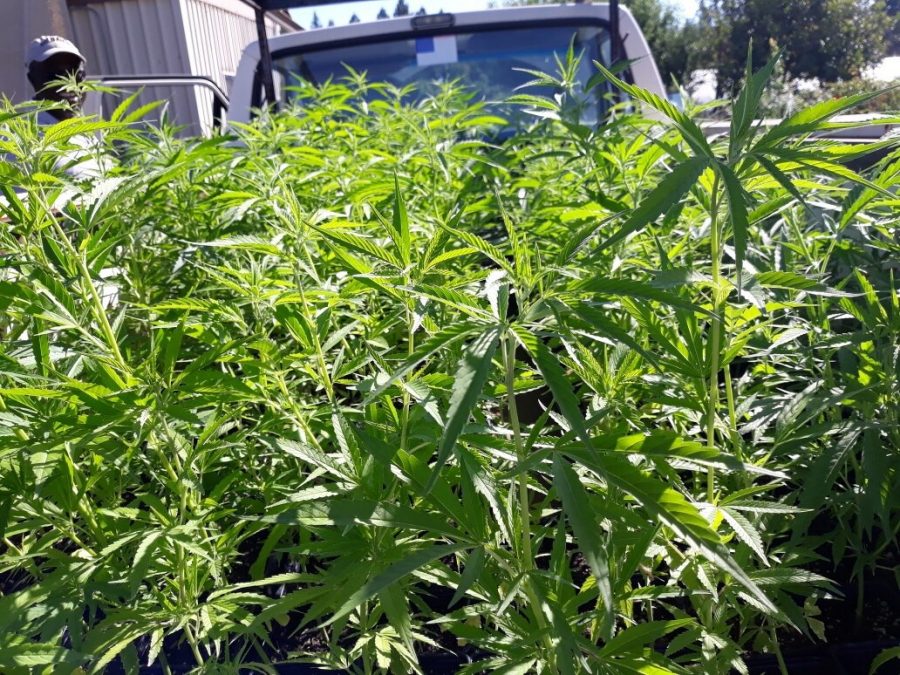Over the summer, Santa Rosa Junior College became the first community college in California to develop a CBD-focused hemp agriculture program on campus with the goal of launching the program for students by Fall 2020.
This would also make SRJC the first community college in the country to offer a fully-accredited certificate and Associate of Science degree program focused solely on hemp.
“People [at other colleges] have been trying to do it for a while now, but they haven’t taken off yet. No one, to my knowledge, has a program for students,” said George Sellu, one of the program’s leading faculty members who holds a doctorate in agricultural science and education from the University of California, Davis.
Hemp, a distinct biotype of cannabis sativa, is already legal at state and federal levels. It does not contain the psychoactive component of marijuana, THC. Growing outdoor hemp requires no electricity and requires less water than many other crops.
On July 12, student volunteers and faculty members already transplanted 900 hemp plants from a greenhouse a 0.8-acre test plot at Shone Farm. It is the first hemp farm at a California community college and is already registered with the Sonoma County Agricultural Commissioner’s Office.
Ben Goldstein, dean of agriculture at SRJC, said that one of the reasons this program is unique is its specific focus on CBD harvest and extraction.
CBD (Cannabidiol) is a non-psychoactive hemp product and a popular treatment for conditions ranging from nausea to anxiety. CBD is also an effective alternative to traditional pain medications.
The hemp plants at Shone Farm are not grown for fiber but flower, which can be harvested and used to extract hemp oils and CBD. Hemp fiber can be used for clothing and industrial production, whereas hemp flower can be used for medicines, topicals and soaps. Both are legal under current federal and state law.
However, because of a lack of clarity in federal regulations, CBD extraction will not be done on campus.
Shone Farm will treat hemp flower like any other agricultural commodity and someday sell it to outside entities for extraction once a price point has been established.
The current goal is to find the best way to plant hemp in Sonoma County, rather than focus on post-production. This includes processes such as drying the plant and extracting the flower.
As of now, Shone Farm typically sells its agricultural products, such as olive oil and wine, to local customers. In 2020, it plans to explore the concept of growing and selling high-quality hemp nursery stock to the local agricultural community to encourage crop diversification and sustainable agriculture in Sonoma County.
Students will be able to officially enroll in the hemp program, like any other class or major, starting in Fall 2020.
In the meantime, interested students can enroll in some courses in Spring 2020 to get a head start on their coursework.
Students who apply for the program can expect to learn and perform the integral skills of managing plants in-field, propagating clones and testing chemical content.
Supporters of the program say they hope to provide an immersive, hands-on education to students looking to work in the multi-billion dollar hemp industry.
Students can also use the knowledge gained from this program in the marijuana industry. SRJC does not take a stance on which industry students work outside of school or upon graduation.
“There is no other community college doing this, and it’s so relevant in California. There are thousands of jobs for students with knowledge in hemp agriculture,” said Norma Gomez, an SRJC student who volunteered over the summer.
Sellu was impressed with student participation.
“We have about 22 students who plan on doing an independent study [at Shone Farm this semester],” he said.
Tara Faber was one of the most dedicated student volunteers over the summer.
“I was able to learn from George [Sellu], then take what I learned in more thoroughly by then teaching and passing on that knowledge to my peers. I am grateful for the faculty and staff at Shone Farm for giving us the privilege and opportunity to have the Industrial Hemp Project this summer,” she said.
“I hope future students will have the opportunity that we have had. I hope they will have the feeling of reverence that I get when I look at the field of hemp and think, ‘Wow, I did that.”




